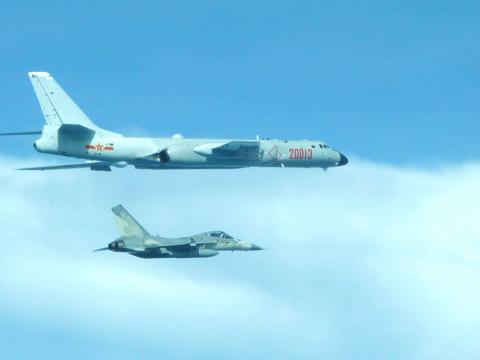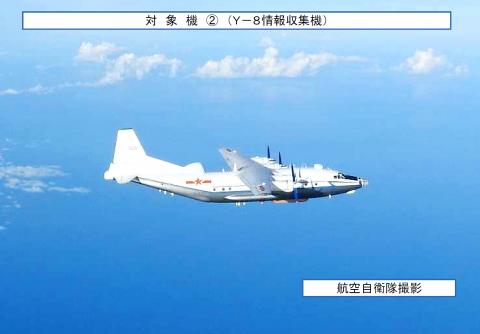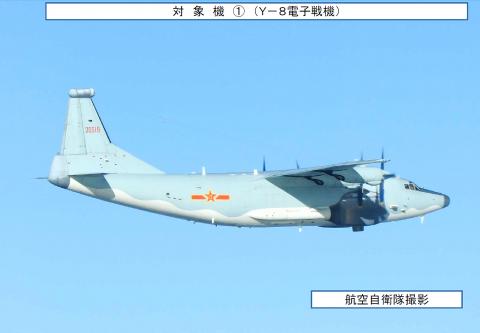The flight path of 10 Chinese People’s Liberation Army Air Force (PLAAF) aircraft flying over international waters off Taiwan’s east coast and through the Miyako Strait between Japan’s Miyako and Okinawa islands on Thursday was fully monitored, the Ministry of National Defense (MND) said yesterday.
Two Chinese Xian H-6 bombers and other airplanes flew over the Miyako Strait, the Japanese Ministry of Defense said, adding that Chinese warships and airplanes have been seen passing through the strait with increased frequency.
From 2012 to last year, PLAAF planes crossed the Miyako Strait between four and six times per year, according to data obtained from the Japanese ministry.

Photo courtesy of the Ministry of National Defense
They have already crossed the strait three times this year, according to data.
Chinese airplanes have flown over the international waters off Taiwan’s east coast at least seven times since the Democratic Progressive Party (DPP) came to power in May last year, military observers in Taiwan said, adding that the number of airplanes has increased with each mission.
The flight was in accordance with the PLAAF’s long-distance flight training regimen and the Republic of China Air Force (ROCAF) monitored the movements of the Chinese planes, the MND said.

Photo courtesy of the Ministry of National Defense Japan
The MND released pictures of Indigenous Defense Fighters (IDF) shadowing the Chinese planes.
The Presidential Office said in a statement that the MND is closely monitoring all Chinese military activity and reports have been forwarded to the National Security Council, which directly advises the president.
All early warning systems and national defense measures are in place and ready, Presidential Office spokesman Sidney Lin (林鶴明) said.

Photo courtesy of the Ministry of National Defense Japan
The public should rest assured that the MND is ready to defend the nation, it said.
In a similar military exercise last week, China flew six warplanes over the Miyako Strait, which the MND at the time said it had also monitored.
Such exercises are legal and proper and Japan should “get used to it,” the Chinese Ministry of National Defense said at the time.
The flyover by the formation of Xian H-6 bombers was “unusual,” Japan’s defense ministry said in a statement, but added that there had been no violation of the nation’s airspace.
Additional reporting by CNA and Reuters

‘TAIWAN-FRIENDLY’: The last time the Web site fact sheet removed the lines on the US not supporting Taiwanese independence was during the Biden administration in 2022 The US Department of State has removed a statement on its Web site that it does not support Taiwanese independence, among changes that the Taiwanese government praised yesterday as supporting Taiwan. The Taiwan-US relations fact sheet, produced by the department’s Bureau of East Asian and Pacific Affairs, previously stated that the US opposes “any unilateral changes to the status quo from either side; we do not support Taiwan independence; and we expect cross-strait differences to be resolved by peaceful means.” In the updated version published on Thursday, the line stating that the US does not support Taiwanese independence had been removed. The updated

‘CORRECT IDENTIFICATION’: Beginning in May, Taiwanese married to Japanese can register their home country as Taiwan in their spouse’s family record, ‘Nikkei Asia’ said The government yesterday thanked Japan for revising rules that would allow Taiwanese nationals married to Japanese citizens to list their home country as “Taiwan” in the official family record database. At present, Taiwanese have to select “China.” Minister of Foreign Affairs Lin Chia-lung (林佳龍) said the new rule, set to be implemented in May, would now “correctly” identify Taiwanese in Japan and help protect their rights, the Ministry of Foreign Affairs said in a statement. The statement was released after Nikkei Asia reported the new policy earlier yesterday. The name and nationality of a non-Japanese person marrying a Japanese national is added to the

AT RISK: The council reiterated that people should seriously consider the necessity of visiting China, after Beijing passed 22 guidelines to punish ‘die-hard’ separatists The Mainland Affairs Council (MAC) has since Jan. 1 last year received 65 petitions regarding Taiwanese who were interrogated or detained in China, MAC Minister Chiu Chui-cheng (邱垂正) said yesterday. Fifty-two either went missing or had their personal freedoms restricted, with some put in criminal detention, while 13 were interrogated and temporarily detained, he said in a radio interview. On June 21 last year, China announced 22 guidelines to punish “die-hard Taiwanese independence separatists,” allowing Chinese courts to try people in absentia. The guidelines are uncivilized and inhumane, allowing Beijing to seize assets and issue the death penalty, with no regard for potential

‘UNITED FRONT’ FRONTS: Barring contact with Huaqiao and Jinan universities is needed to stop China targeting Taiwanese students, the education minister said Taiwan has blacklisted two Chinese universities from conducting academic exchange programs in the nation after reports that the institutes are arms of Beijing’s United Front Work Department, Minister of Education Cheng Ying-yao (鄭英耀) said in an exclusive interview with the Chinese-language Liberty Times (the Taipei Times’ sister paper) published yesterday. China’s Huaqiao University in Xiamen and Quanzhou, as well as Jinan University in Guangzhou, which have 600 and 1,500 Taiwanese on their rolls respectively, are under direct control of the Chinese government’s political warfare branch, Cheng said, citing reports by national security officials. A comprehensive ban on Taiwanese institutions collaborating or